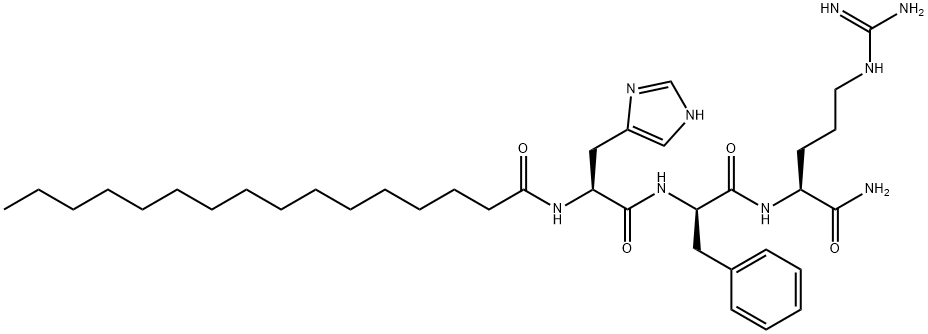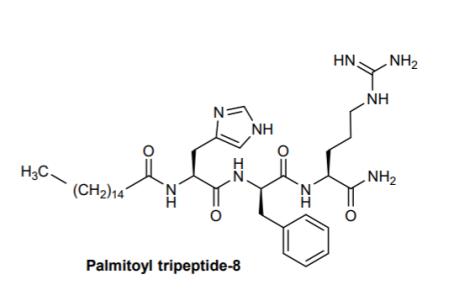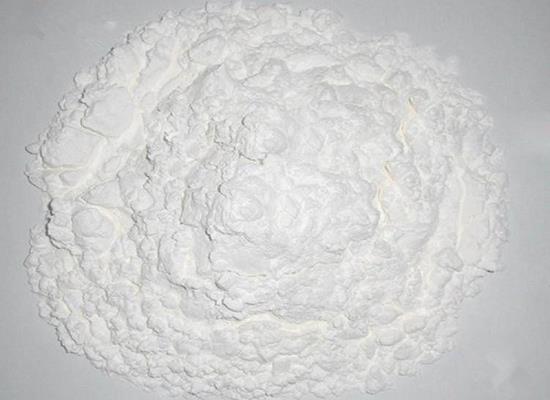Palmitoyl Tripeptide-8: Biological Functions, Mechanism of Action, Benefits and Applications in Skincare
General Description
Palmitoyl Tripeptide-8 is a peptide compound with significant biological functions in skincare. It interacts with the melanocortin 1 receptor (MC1-R) to modulate inflammatory responses in the skin. By inhibiting the binding of α-melanocyte-stimulating hormone (α-MSH) to MC1-R, it effectively reduces the release of inflammatory cytokines and alleviates symptoms such as redness and swelling. This peptide also mitigates neurogenic edema, providing soothing effects on the skin. Due to its ability to reduce skin reactivity and alleviate inflammation, Palmitoyl Tripeptide-8 is ideal for sensitive skin care. Palmitoyl Tripeptide-8 promotes skin comfort and well-being, making it a valuable component in skincare products aimed at maintaining healthy and balanced skin.

Figure 1. Palmitoyl Tripeptide-8
Biological functions
Palmitoyl Tripeptide-8, also known as PPT-8, is a peptide compound derived from plants or synthesized, comprising the fatty acid palmitic acid and the tripeptide-8. It consists of arginine, histidine, and phenylalanine and is characterized as a multifunctional neuropeptide. When combined with beneficial fatty acids like palmitic acid, it becomes more advantageous for the skin. These peptides have the ability to penetrate the epidermis and reach the dermis, where they regulate skin proteins. Palmitoyl Tripeptide-8's biological functions are significant, particularly in keratinocytes, where it binds with MC1-R to reduce the release of the inflammatory cytokine IL-8 induced by UVB radiation. Additionally, within keratinocytes, it inhibits IL-8 production induced by IL-1α, indicating its capability to suppress early stages of the inflammatory cascade reaction. Furthermore, Palmitoyl Tripeptide-8 can mitigate a series of adverse consequences triggered by substance P release. As a member of the peptide family, it shares similar mechanisms of action with tetrapeptides. 1
Mechanism of action
The anti-allergy and soothing mechanism of Palmitoyl Tripeptide-8 involves its interaction with the melanocortin 1 receptor (MC1-R) and the modulation of inflammatory responses in the skin. Within the skin, certain endogenous neuropeptides possess natural anti-inflammatory activity and play vital roles in inflammatory reactions and immune regulation. One such neuropeptide is α-melanocyte-stimulating hormone (α-MSH), a derivative of proopiomelanocortin (POMC), which exhibits significant regulatory effects on skin immunity and inflammatory responses. α-MSH binds to MC1-R with high affinity, leading to the upregulation of inflammatory cytokines such as IL-1, IL-6, IL-8, and TNF-α. By acting as a highly selective competitive inhibitor of MC1-R, Palmitoyl Tripeptide-8 effectively inhibits the binding of α-MSH to MC1-R, thus exerting anti-inflammatory effects. Palmitoyl Tripeptide-8 reduces the adverse consequences triggered by substance P release, leading to a decrease in the release of inflammatory cytokines (IL-1, IL-8, TNF-α), alleviating vasodilation, preventing and reducing external stimuli irritation, relieving symptoms such as itching, stinging, erythema, and edema, maintaining the normal sensitivity threshold of the skin, and promoting overall skin health. By mimicking the action of α-MSH, Palmitoyl Tripeptide-8 effectively regulates the inflammatory response in the skin, demonstrating its potential as an active ingredient in skincare formulations aimed at addressing various skin concerns. Its ability to modulate MC1-R and inhibit inflammatory cytokine release makes it a valuable component for soothing sensitive and reactive skin, contributing to the maintenance of healthy and balanced skin function. 2
Benefits and applications in skincare
Palmitoyl Tripeptide-8 offers a range of benefits and applications in skincare due to its ability to reduce skin reactivity, alleviate inflammatory responses, and mitigate neurogenic edema. It is particularly well-suited for the care of sensitive skin, demonstrating efficacy in rapidly alleviating inflammation-related symptoms such as redness, swelling, and discomfort. By diminishing the skin's response to irritants and reducing inflammatory reactions, Palmitoyl Tripeptide-8 supports the maintenance of skin health and comfort. Its capacity to mitigate neurogenic edema contributes to a soothing effect on the skin, providing relief from symptoms of inflammation. These properties make it an ideal ingredient for skincare formulations aimed at addressing the needs of sensitive skin, offering a gentle yet effective approach to calming and nurturing delicate skin types. When incorporated into skincare products, Palmitoyl Tripeptide-8 serves as a valuable component for promoting skin comfort and well-being, making it an essential consideration for individuals seeking relief from inflammatory conditions and desiring a proactive approach to maintaining healthy, balanced skin. 3
Reference
1. Cosmetic Ingredients Dictionary: Neutrazen. INCI GUIDE.
2. Ferreira MS, Sousa Lobo JM, Almeida IF. Sensitive skin: Active ingredients on the spotlight. Int J Cosmet Sci. 2022;44(1):56-73.
3. Resende DISP, Ferreira MS, Sousa-Lobo JM, Sousa E, Almeida IF. Usage of Synthetic Peptides in Cosmetics for Sensitive Skin. Pharmaceuticals (Basel). 2021;14(8):702.
Related articles And Qustion
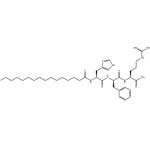
US $0.00/kg2025-10-24
- CAS:
- 936544-53-5
- Min. Order:
- 1kg
- Purity:
- 99%
- Supply Ability:
- 1000kg
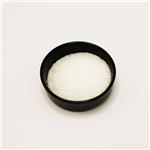
US $500.00-500.00/kg2025-10-10
- CAS:
- 936544-53-5
- Min. Order:
- 1kg
- Purity:
- ≥99.00%
- Supply Ability:
- 1000000
